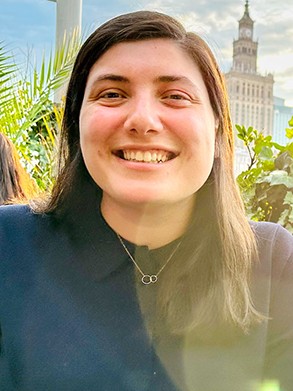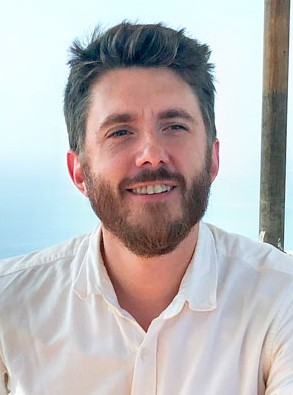Einaudi fellowships support students learning uncommon languages
By Olivia M. Hall
When Frances Cayton walked the streets of Warsaw, Poland, last summer, Ukrainian was in the air – spoken by refugees from the neighboring country’s ongoing war. After studying Ukrainian virtually for three months during her research in Poland, she started to pick up parts of the conversations.
“Doing so felt like unlocking a whole other side of this city,” she said.
Now in her third year as a doctoral student in the field of government, Cayton believes that growing her skills in Ukrainian is key to her dissertation in comparative politics. She was able to kick-start her learning over the summer thanks to a Rare and Distinctive (RAD) Language Fellowship from the Mario Einaudi Center for International Studies.
Supported by a gift from Mark E. Hansen ’79, RAD Language Fellowships extend the benefits offered by federally funded Foreign Language and Areas Studies (FLAS) Fellowships, which at Cornell support U.S. citizens and permanent residents studying South Asian and Southeast Asian languages. All Cornell graduate and undergraduate students are eligible for RAD fellowships.
The fellowships support intensive summer study of “rare and distinctive” modern languages offered at Cornell. Of the more than 50 languages taught at Cornell, nearly two dozen qualify as among the world’s least commonly taught, including Zulu, Finnish, Yiddish, Sinhala, Tibetan and Burmese. Students are invited to apply now for a RAD fellowship, offering a stipend of $3,500 and allowance for fees and tuition up to $5,000, for study in summer 2024. The deadline is Feb. 21.
“Language is essential to understanding people and, through them, the politics and history of places they have made what they are,” said Cayton, whose work centers on East-Central Europe. Her dissertation grapples with the effects of Russia’s invasion of Ukraine on politics in the region, including how preexisting civil society-party networks affect aid to Ukrainian refugees.
“To consider Ukrainian perspectives on these questions, I need access to Ukrainian media, scholarship and interlocutors,” she said.
Prevented by the war from traveling to Ukraine, Cayton opted for one-on-one Zoom classes hosted by the Ukrainian Catholic University in Lviv. Thanks to five years of studying Polish – including a summer at Jagiellonian University in Kraków supported by Einaudi’s Institute for European Studies – she could build on the languages’ many similarities. “The biggest challenge has been getting used to the Cyrillic script,” she said.
As Cayton prepares for next year’s fieldwork in Poland and Hungary, she continues to work on grammar and vocabulary in weekly online sessions with a tutor in Ukraine.
A continent away, global development doctoral student Jarvis Fisher has been using a RAD Language Fellowship to work on his Wolof, Senegal’s most widely spoken language. “I hope it will help facilitate the quality and depth of my interviews and lead to interesting conversations with new people,” said Fisher, who plans to examine the West African nation’s efforts to achieve rice self-sufficiency and an agroecological transition, and the effects on rural labor.
Fisher first studied Wolof during an undergraduate study abroad semester in Senegal. Staying with host families in rural areas piqued his interest in the challenges of balancing agricultural development and farmworkers’ needs. While he pursued his fascination with rural development in Senegal through six years of working with NGOs, maintaining his Wolof proved difficult. “I used it infrequently when I was working, and I needed a more rigorous environment to really improve,” he said.
At Cornell, Fisher found the structure he needed, taking multiple virtual courses through the Shared Course Initiative. “These set me up well for the intensive course the RAD generously agreed to fund this fall at the Dakar Language Center,” he said. The biggest challenge, he says, has been mastering the vocabulary, which has few cognates with English.
Fisher feels he is making rapid improvement, with daily opportunities to put his new skills to immediate use with native speakers. “It’s the push I really needed to become more confident and conversant,” he said.
Olivia M. Hall is a freelance writer for Global Cornell.
Media Contact
Abby Kozlowski
Get Cornell news delivered right to your inbox.
Subscribe


